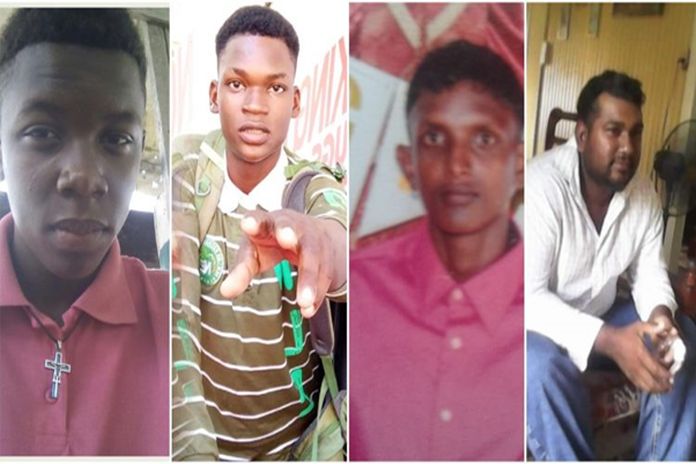By Indranie Deolal
Wearing a brown New York Yankees cap and the now customary mask, a composed Gladson Henry looked straight ahead last Wednesday and spoke simply and plainly from his great, big heart. The father of murdered student Isaiah Henry, 16, said firmly, “I will not hate, I am not racist.”
The dignified, dry-eyed Henry had just witnessed, what no father should ever have to, the autopsy on the extensively mutilated bodies of his young son, Isaiah and the boy’s cousin, the 18-year-old labourer Joel Henry, who were found on Sunday, butchered and dumped in bushes near to a coconut estate in the rural farming village of Cotton Tree, West Coast Berbice, along Guyana’s north-eastern coastline.
The post mortem examinations confirmed that they were chopped repeatedly until they died from haemorrhage and shock. The spines of both teenagers were severed in the heinous attack and a national tragedy that will haunt us for generations to come. The pair had left home early the day before, to collect and peel dry coconuts for sale.

Rocked the country
Even as Henry was speaking to the media, another young Guyanese, 17-year-old Haresh Singh would never make it back home from the Berbice backdams of death. The murders have rocked the country, threatening to plunge it into a dangerous maelstrom of rising anger, public demonstrations and violence, reviving old fears of ethnic division and disaster. (Update: By Friday, the country’s Joint Forces had managed to clear the streets of protesters, allowing normal traffic to resume).
That morning, Haresh, his immediate family’s lone income earner, returned on his motorbike to take water for his thirsty uncles working in the area. His bike was discovered burnt hours later, and he was left severely beaten and chopped, in what is believed to be a reprisal ambush. Around midday, he was rushed to hospital but died. Haresh is reported to be the grandson of one of the seven suspects arrested in connection with the Henry slayings. None of them have been officially named or charged, up to press time, with little details of the ongoing investigations forthcoming from the authorities.
Month-old administration
Hours later, another man would breathe his last after being beaten by enraged protesters. Pritipaul Hargobin, 34, of Bath Settlement, West Coast Berbice, supposedly exited the vehicle with a shotgun and discharged one round into the air before discharging three more towards the nearby crowd, according to a bizarre police report which did not explain how there were no injuries among the demonstrators.
So far, there is no indication whether the barely-month-old administration of president Irfaan Ali will impose more stringent restrictions such as a state of emergency, to regain control in the midst of the COVID-19 pandemic, in an already tumultuous year marred by an acrimonious five-month-long election stand-off. In an address this week, he sought to assure the nation that justice will prevail, but he criticised the new Opposition Leader, Joseph Harmon, for incendiary comments.
“Calling this a struggle against a fraudulent government and oppression tells you the extent to which Harmon is trying to misuse the circumstances that surround us as a nation,” the president said. Chairwoman of the main People’s National Congress Reform (PNCR) party, Volda Lawrence urged restraint, “We’re not a people who kill our children, we’re not a people who maim each other, we’re not barbarians, we’re Guyanese.”
Dr Ali, who later visited the families of the four murder victims, announced that Guyana has asked the United Kingdom and the Caribbean Regional Security System to assist the police force with probing the grisly killings.
Traumatised Guyanese
The bile rises in the throat, and the tears fall, as traumatised Guyanese of all backgrounds, at home and abroad, struggle to cope with the sickening news and images. In the midst of illness here in Trinidad and Tobago, I felt numb and stunned, crying as a mother, and as a national. It is evident that our homeland needs fresh, enlightened leadership from respected community elders and feuding politicians, some of whom unabashedly stoke the fires of conflict that have led to houses and vehicles being torched, and countless people being abused, robbed and assaulted.
We mourn the innocent victims lost and the latest youngsters scarred, even as we pray for lasting peace and reconciliation from all sides, tormented by questions of how traditionally close-knit communities have descended into such depths of hate and horror.
Pastor and family
A pastor’s wife, Sabrina Persaud, related that Joel’s mother, Sister Gail Johnson was a church member before moving to West Berbice. This week, a grieving Johnson, a hard-working single mother who toiled at various low-income jobs to decently raise her eight children, wept, recalling her youngest son’s willingness to help all, noting that Joel will be missed by many.
“I’m discouraged, I’m sad… my son was a very loving person, caring, always hustle to try to help me,” she told the News Room.
Persaud and her family including two children, were among those whose vehicles were stopped on Sunday night. “They beat my husband, pastor Premraj Parshotam just because he happens to be Indian…(bear in mind he’s married to a mixed woman…) He pastors not one but two churches that (have) brethren of all the six races, actually both are predominantly made up of more Africans (Guyanese) than Indians (Guyanese).”
“While beating him (and he’s not even trying to resist any of the blows…he stood there and took every blow all the while telling them he’s a pastor and all we want is to get home…” she said in a public social media post.
Towering role model
As we search for answers and ways of stepping back from the abyss, one gentleman has emerged as a towering role model with words of wisdom and a resounding message for all.
The humble father, Henry, a Christian, declared, “I am not a racial person. I born in Number Three (village). The community I live in (is) among Indian people. We eat together. We sleep together…we live together” and “the majority of my friends that I move with are Indian…We live like brothers, big men, and because of how I was moving, they give me a nickname, and that nickname is ‘geerah’ (black cumin) and the meaning of ‘geerah’ is that they come up with is because ‘geerah’ have to go in the dhall.” Dhall is a popular Indian-derived sauce made from yellow split peas or lentils, spiced with roasted cumin and garlic.
“I still love my Indian brothers and sisters.” He added, “I am not supporting unmoral protesting because I went out in Number 5 (Village) and I told them straight, if you want to protest is our right but let us do it peacefully,” and he repeated “peacefully.” Isaiah was jovial and grew up in church. “I taught him the ways of the Lord and he was a nice and quiet boy,” his dad remembered in an earlier interview.
Stressed peace
Henry stressed peace, saying “The nation cannot be fighting against one another, we cannot be fighting against one another because this is going on too long,” pointing out that “I go to Muslim mosque (and) Hindu temple, I play Phagwah…” Phagwah or Holi is the Hindu spring festival of colours and a national holiday, celebrated with the throwing of water and coloured liquids and powders.
“Let we not see this thing as Black, White, Chinese or Putagee (Portuguese) because if a Black man did do this or a Chinese man did do this or any man did do this and if is not my family, I believe and I swear in my heart that he will have to pay the penalty…,” he maintained on Wednesday. The Henry boys will be buried on Sunday.
“We should not condone people because of their race doing these things, I am not political or racial” and “I pray every day that (bad) things don’t happen because I have friends all in Bath settlement, some of them know me, they work with me…”
He concluded, “I just want to see justice for my son (and nephew), (as) any mother or father, any friend, or anybody would like to see for their family, sons, brothers…” (Video interview at https://www.facebook.com/sunil.tickaram/videos/3608229459220393)
*ID reaches for a worn copy of Martin Carter’s “Poems of Resistance” and wearily reads, “Like a jig/shakes the loom/like a web/is spun the pattern/all are involved!/all are consumed.”





